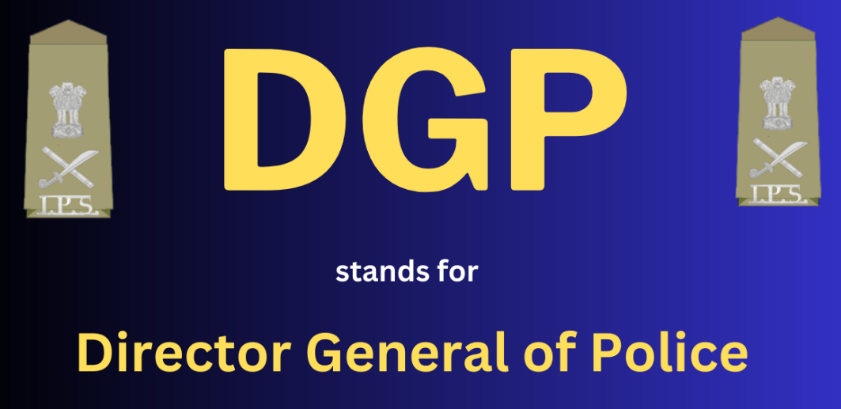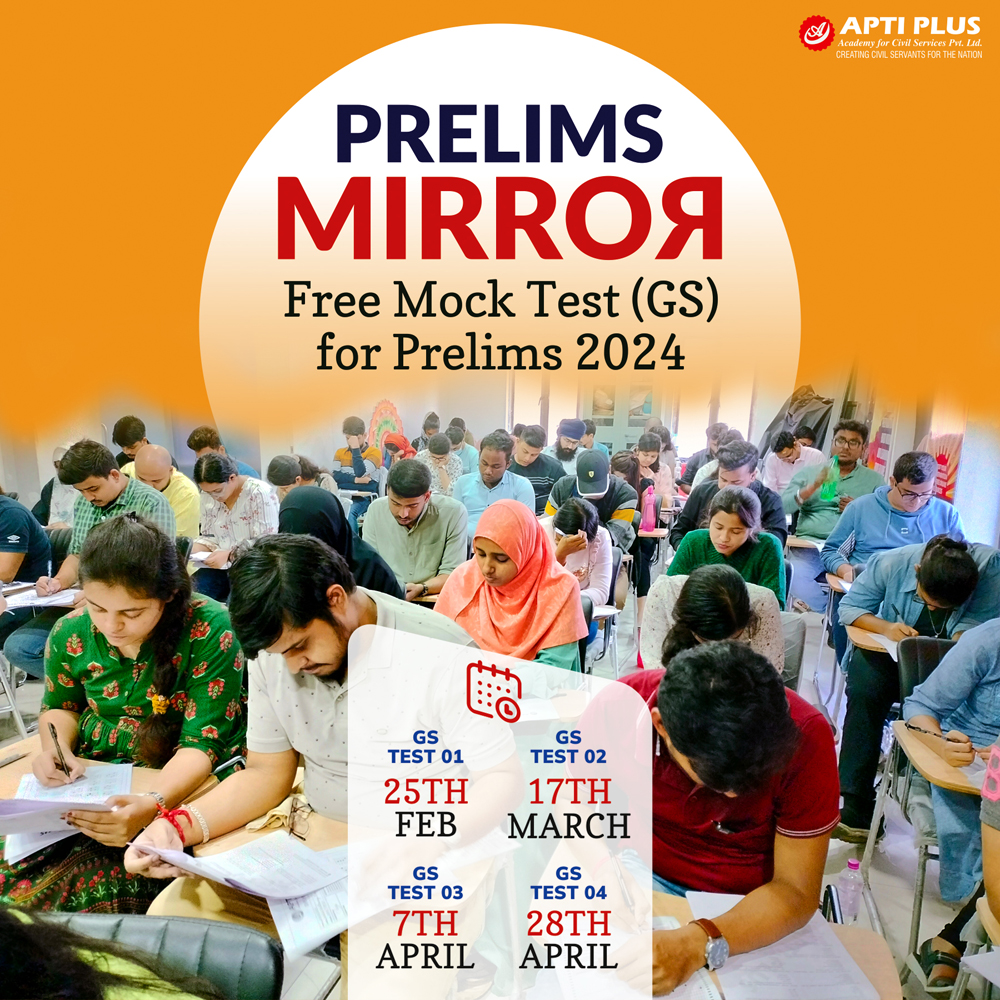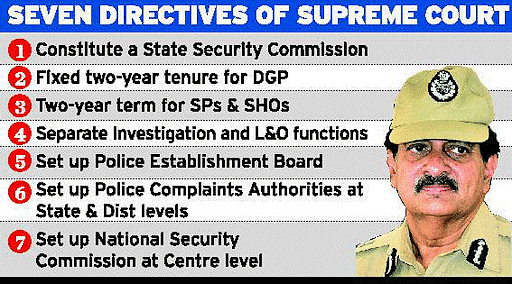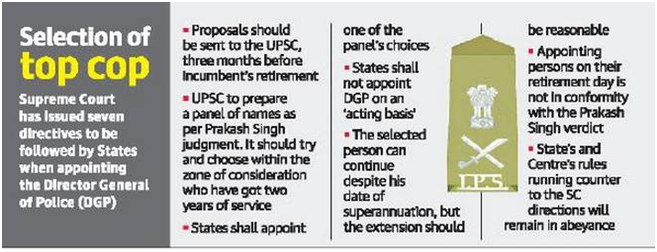
Disclaimer: Copyright infringement not intended.
Context
- The Union Ministry of Home Affairs (MHA) has taken note of several states appointing officiating Director General of Police (DGP) despite the availability of eligible officers.
- The MHA has reminded states to adhere to the Supreme Court's directives on such appointments, emphasizing the avoidance of temporary or "acting DGPs" except in exceptional circumstances.
Director General of Police (DGP)
- Director General of Police (DGP) is a rank in the Indian Police Service, held by the highest ranking police officer in a State or a Union Territory of India, typically heading the state or the UT police force.
- The DGP is appointed by the cabinet and holds a three-star rank.
- The rank insignia of a Director General of Police is the national emblem over crossed sword and baton.
- DGP-ranked officers wear Gorget patcheson their collar which have a dark blue background with an oak leaf pattern stitched on it.
Appointment Process of DGP
The appointment process for the Director General of Police (DGP) in India typically involves the following steps:
- Recommendation: The state government recommends a senior police officer for the position of DGP to the Union Public Service Commission (UPSC) or the State Public Service Commission (SPSC), depending on the state's regulations.
- Selection Committee: A selection committee, usually chaired by the Chief Minister or Home Minister, is formed to select the DGP. The committee includes senior officials and sometimes a member of the UPSC or SPSC.
- Review of Eligibility: The UPSC or SPSC reviews the recommended officer's eligibility based on criteria such as seniority, experience, and performance.
- Appointment Order: Once the candidate is approved, the state government issues an official appointment order appointing the officer as the DGP.
- Notification: A notification is issued to announce the appointment of the new DGP, and the officer assumes office after receiving the notification.
- Tenure: The DGP typically serves a fixed term, as per state regulations or until retirement age, whichever comes earlier. The fixed term for the Director General of Police (DGP) in India can vary depending on the state and the specific regulations in place. In many states, the DGP's term is typically around two years, but it can be longer or shorter in some states. Some states may also have provisions for extensions or reappointments based on the discretion of the state government or relevant authorities.
- Roles and Responsibilities: The DGP is responsible for overseeing the state police force, implementing law and order, and coordinating with other agencies to maintain security and public safety.
- Oversight and Accountability: The DGP is accountable to the state government and is expected to provide regular reports and updates on law enforcement activities.

Issues pertaining to Appointments of Director General of Police (DGP) in India
Appointments of Director General of Police (DGP) in India can sometimes be a contentious issue due to various factors. Some of the key issues include:
- Political Interference: There are concerns about political interference in the selection process, with allegations that appointments are sometimes made based on political considerations rather than merit.
- Seniority vs. Merit: The balance between considering seniority and merit in the selection process can be a contentious issue. While seniority is often a crucial factor, there are arguments for giving more weight to merit and performance.
- Transparency and Accountability: There are calls for more transparency in the selection process to ensure that appointments are made based on objective criteria and that there is accountability in the process.
- Tenure and Stability: The fixed tenure of DGPs can sometimes lead to instability, especially if there are frequent changes in leadership. This can impact the effectiveness of the police force and continuity in policy implementation.
- Legal Challenges: Some appointments of DGPs have faced legal challenges, particularly regarding the interpretation of laws related to appointments and the role of the UPSC or SPSC in the process.
- Conflict with Central Government: There have been instances where appointments of DGPs have led to conflicts between the state government and the central government, particularly regarding the powers of each in the appointment process.
Implications on the Effectiveness and Independence of the Police Force:
Impact on Effectiveness:
- Political interference can lead to appointments based on loyalty rather than competence, affecting the quality of leadership and decision-making.
- Lack of transparency and accountability can erode public trust in the police force, hindering its ability to effectively combat crime.
- Conflict between state and central governments can create operational challenges and hinder effective coordination in law enforcement efforts.
Compromise of Independence:
- Political interference undermines the autonomy of the police force, compromising its ability to act impartially and enforce the law without fear or favor.
- Seniority-based appointments without due consideration to merit can result in ineffective leadership, affecting the overall independence and integrity of the police force.
Instability and Inconsistency:
- Frequent changes in leadership due to lack of fixed tenures can lead to instability and inconsistency in policy implementation and enforcement, affecting the overall effectiveness of the police force.
- Legal challenges and conflicts with the central government can create uncertainties and distractions, diverting attention from core law enforcement duties and impacting the independence of the police force.
Erosion of Public Trust:
- The perception of nepotism and favoritism in appointments can erode public trust in the police force, hindering cooperation and support from the community.
- Lack of transparency and accountability can lead to allegations of corruption and misconduct, further damaging the reputation and effectiveness of the police force.
Overall Impairment of Functioning:
- Cumulatively, these challenges can impair the overall functioning of the police force, reducing its ability to maintain law and order, protect citizens, and uphold the rule of law effectively.
Addressing these challenges is crucial to ensuring the effectiveness and independence of the police force, which are essential for maintaining public safety and security.
|
Police Reforms - Prakash Singh Case Directives:
The Supreme Court's directives in the Prakash Singh Case of 2006 aimed to address deep-rooted issues of politicization, lack of accountability, and systemic weaknesses in policing that have led to poor performance and public dissatisfaction.
Directives from the Prakash Singh Case:
Constitution of State Security Commission (SSC):
- The state government must establish an SSC to prevent undue political influence, lay down policy guidelines, and assess police performance.
Appointment of DGP:
- The appointment of the Director General of Police (DGP) should be based on merit and through a transparent process, ensuring a minimum tenure of two years.
Tenure for Operational Officers:
- Police officers handling operational duties, including Superintendents of Police and Station House Officers, should also have a minimum tenure of two years.
Separation of Investigation and Law & Order Functions:
- There should be a clear separation between the investigation and law & order functions within the police force.
Establishment of Police Establishment Board (PEB):
- A PEB should be set up to decide on transfers, postings, promotions, and other service-related matters for police officers up to the rank of Deputy Superintendent of Police, and make recommendations for higher ranks.
Creation of Police Complaints Authority (PCA):
- PCAs should be established at the state and district levels to inquire into public complaints against police officers, with state-level PCA handling complaints against officers of and above the rank of Deputy Superintendent of Police, and district-level PCA handling complaints against lower-ranking personnel.
Formation of National Security Commission (NSC):
- An NSC should be formed at the union level to prepare a panel for the selection and placement of Chiefs of Central Police Organizations (CPO) with a minimum tenure of two years.
|
Appointment of DGPs - Supreme Court 2018 Guidelines:
Background:
- These directions were issued by the Supreme Court in response to an application by the Centre for the modification of its 2006 judgment in the Prakash Singh Case. The original judgment aimed to reform and bring transparency to state police forces.
Guidelines
- Consultation with UPSC: The Supreme Court has directed State governments to consult the Union Public Service Commission (UPSC) before appointing DGPs. This move aims to ensure transparency and meritocracy in the selection process.
- Timeline for Nomination: State governments must send the names of potential candidates to the UPSC at least three months before the incumbent DGPs are set to retire. This timeline allows for a thorough review and selection process.
- UPSC Panel Selection: The UPSC will then prepare a panel of three officers deemed fit for the DGP position and send it back to the state government. The selection process emphasizes merit and seniority.
- Appointment from UPSC Panel: The State government is required to immediately appoint one of the individuals shortlisted by the UPSC as the DGP. This ensures that the selection is based on the UPSC's recommendations.
- Permanent DGP Appointment: The Supreme Court has rejected the practice of appointing "Acting DGPs," stating that States must appoint a person as a permanent DGP. This move aims to bring stability to the leadership of state police forces.
- Suspension of State Laws: The Court has ruled that any state laws or rules regarding the appointment of police officers will be suspended. However, states with existing laws on police appointments can seek modifications to comply with the Court's guidelines.

These guidelines highlight the Court's efforts to ensure that the appointment of DGPs is based on merit, seniority, and transparency, thereby enhancing the effectiveness and integrity of state police forces.
Thus,
Appointment of DGP (Old Rule)

Appointment process (as per 2018 SC directive):

States' Response to Supreme Court Directives on Police Reforms:
Non-Compliance with Apex Court Directives:
- A Commonwealth Human Rights Initiative (CHRI) report (2020) revealed that no state fully complied with the directives laid down by the Supreme Court in the Prakash Singh case regarding police reforms.
Legislative Changes in States:
- After 2006, 18 states either passed or updated their Police Acts, but none of them fully aligned with the legislative models proposed in the 2006 decision.
Criticism and Discretion:
- Some states criticized the SC judgement, pointing out perceived flaws.
- States argued for the Chief Minister to have discretion in selecting the DGP, suggesting that the government's choice might not always be among the three most senior officers.
Contention over DGP Appointment Process:
State Laws Bypassing UPSC Empanelment:
- Several states have enacted laws or issued executive orders to bypass the empanelment process required by the UPSC for the appointment of DGPs.
- The West Bengal government has approached the Supreme Court (SC) to modify its 2018 judgment on the matter.
Reasons for Contention:
- Police and public order are exclusively within the state's jurisdiction.
- Until Parliament passes a new statute, the UPSC lacks the authority to consider and appoint the DGP.
- The SC should refrain from restricting a state's legislative powers under the principles of judicial review or its extraordinary authority (Article 142 - Power to issue orders for complete justice).
Appointment of Temporary DGPs:
States with Temporary DGPs:
- Andhra Pradesh, Telangana, Uttar Pradesh, and Punjab have had temporary DGPs for nearly or over a year.
- Uttarakhand, Odisha, West Bengal, and the Union Territory of Jammu and Kashmir have recently appointed "acting DGPs".
Instances in Uttar Pradesh:
- Uttar Pradesh has had four acting DGPs in the last 20 months.
MHA Directive to Defaulting States:
- Defaulting states are instructed to adhere to Supreme Court directions and Union Public Service Commission guidelines for appointing regular DGPs with a minimum tenure of two years.
- Temporary or "acting DGPs" should only be appointed in exceptional circumstances.
- Top of Form
.jpg)
Way Ahead
- Implementing the Prakash Singh Case Directives: States should fully implement the directives laid down by the Supreme Court in the Prakash Singh Case of 2006, including the establishment of State Security Commissions, Police Establishment Boards, and Police Complaints Authorities.
- Amendment of the Police Acts: In 2024, the Indian police system is still governed by the antiquated Police Act of 1861. Public expectations from law enforcement have undergone a complete transformation, now demanding a focus on reformative rather than retributive measures. The landscape of crime has been completely reshaped by technological advancements and the emergence of white-collar and sophisticated crimes. Consequently, it is imperative to modernize the policing framework in India to effectively address present-day crime and investigative needs.
- Transparency and Merit-based Selection: DGP appointments should be based on transparent and merit-based processes, as directed by the Supreme Court, with consideration given to seniority, experience, and performance.
- Ensuring Fixed Tenure: DGPs should be appointed for a fixed tenure of at least two years, as mandated by the Supreme Court, to provide stability and continuity in police leadership.
- Training and Capacity Building: Continuous training and capacity building programs should be conducted for police officers at all levels to enhance professionalism and adherence to legal and ethical standards.
- Reducing Political Interference: Efforts should be made to minimize political interference in police appointments and operations, ensuring that decisions are made based on professional considerations rather than political motives.
- Utilizing Technology: Embracing technology such as crime mapping, CCTV surveillance, and digital evidence management to enhance the efficiency and effectiveness of policing.
- Engaging with Civil Society: Foster dialogue and collaboration between police forces and civil society organizations to build trust, improve community-police relations, and ensure accountability.
- Monitoring and Evaluation: Establish mechanisms for monitoring and evaluating the performance of police officers, including DGPs, to ensure accountability and effectiveness in policing.
MUST READ ARTICLE ON POLICE REFORMS: https://www.iasgyan.in/ias-gazette-magazine/perspective-overcoming-policing-challenges
|
PRACTICE QUESTION
Q. Identify and analyze the key challenges faced in the appointment process of the Director General of Police (DGP) in India. Discuss the implications of these challenges on the effectiveness and independence of the police force. Suggest measures to address these challenges and improve the transparency and accountability of DGP appointments.
|














